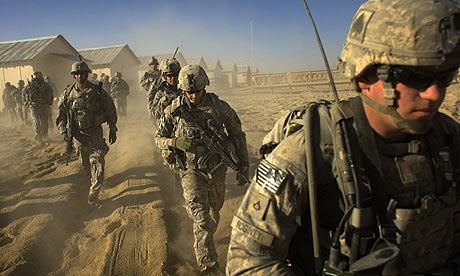As of recent it has been reported that the US is now sticking with its plans to draw down its troop level in Afghanistan. While this is great news, many are wondering if Afghanistan is ready for the drawdown, citing the recent assassinations of not only Hamid Karzai’s brother, but also “Jan Mohammad Khan, a former provincial governor considered an important adviser to President Hamid Karzai, and Mohammad Hashim Watanwal, the parliamentarian.” In addition to this there are also worries about what will occur after the drawdown is completed.
With the drawdown, the problems in Afghanistan have changed as now NATO will have to “consolidate those gains and shift the military main effort to tackle insurgent strongholds in the east — all with fewer troops.” Certain groups are arguing that “removing that much combat power will threaten progress and make it more difficult when the main effort shifts to the east” and instead want US troops to stay. Adding to the worries, is that several European countries are drawing down their troops as well, which will only add more stress to those American and European troops who remain. The Americans themselves are worried about the effects of a drawdown, seeing as how they sent in new elite forces as the drawdown was looming.
Afghans are also worried as there “is an uneasy sense that the North Atlantic Treaty Organization force is painting an overly rosy picture of security” in order to send troops back home. Without a doubt, there are still serious problems:
"Every day, there are killings and kidnappings," said a seamstress named Shalah. Two sons of her neighbors were recently abducted by the Taliban; the family, struggling to raise a ransom, received word a few days ago that one had already been executed.
Afghans are also worried that the US drawdown will allow the Taliban to regroup.
Finally, there is the question of whether of Afghan forces are ready, since they are the ones who will take over more and more as Western forces leave. Most Afghans have “a substantial lack of confidence in the country's security forces.” There are serious problems with the Afghan security forces, such as the fact that some have been suspected of killing Western soldiers and there have been serious training and drug usage problems as well.
This, coupled with the fact that the Taliban’s influence has grown, may prove disastrous for both Afghanistan and the West. If the Afghans prove unable to fight, the US very well may have to re-deploy forces back into Afghanistan.
However, overall the drawdown is quite phony as “the troops who are going to be withdrawn are made up of support troops and the tasks of the support troops will be outsourced to Pentagon-paid contractors who will unleash an unprecedented bloodbath aimed at bleeding the popular opposition to US occupation.”
In addition to this, the US government
is seeking not to defeat militants or to promote democracy in Afghanistan. The aims pursued by the Pentagon are primarily centered on the determination to obtain a military beachhead against its principal rivals in the region: China, Iran and Russia. Behind all the government and media rhetoric about winding down the Afghanistan war and withdrawing US troops, the reality is that the US ruling establishment and the Pentagon are planning to occupy the country indefinitely. (emphasis added)
Taking this into account as well as the other problems mentioned, the US may very well continue its war in Afghanistan for quite some time.
Editor's Note: The revised edition of American Empire Part 2: Onset of Imperial Decline has now been posted and can be viewed here.
Editor's Note: The revised edition of American Empire Part 2: Onset of Imperial Decline has now been posted and can be viewed here.

No comments:
Post a Comment